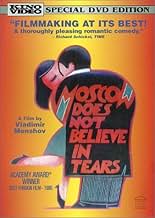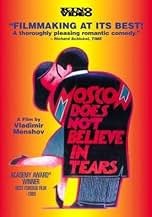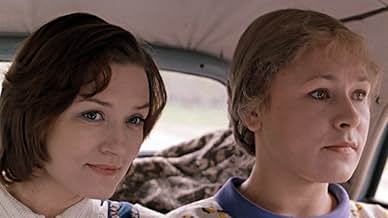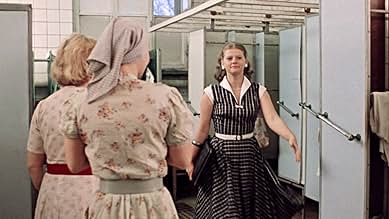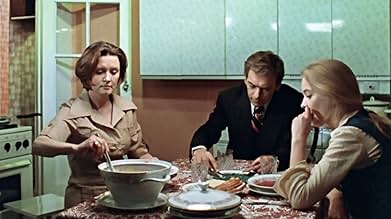PUNTUACIÓN EN IMDb
8,0/10
15 mil
TU PUNTUACIÓN
Esta es la historia de la vida de tres novias desde la juventud hasta el otoño. Sus sueños y deseos, el amor y las decepciones.Esta es la historia de la vida de tres novias desde la juventud hasta el otoño. Sus sueños y deseos, el amor y las decepciones.Esta es la historia de la vida de tres novias desde la juventud hasta el otoño. Sus sueños y deseos, el amor y las decepciones.
- Dirección
- Guión
- Reparto principal
- Ganó 1 premio Óscar
- 3 premios y 1 nominación en total
Vladlen Paulus
- Pyotr Lednev
- (as V. Paulus)
Reseñas destacadas
Being of Russian descent and a first generation Australian, I first saw this film in the original Russian a year or two after it came out. At the time I thought it was one of the funniest things I had seen in a long long time. I saw it again when our World Movie channel broadcast it and I laughed just as hard and just as long. To understand the comedy in what appears to be a story of feminist angst you need to be Russian. There is no other way to see it. We don't see that the supposed conflict between between the heroine and her lover is that she is a manager and he is not. It's much more primal than that. It is because she EARNS more than he does. Women held managerial positions in the USSR since they first began driving tanks and tractors during the second world war. Most of us are brought up to believe that we can do just about anything, and a lot of the time we have to. So please, if you see this film, remember to laugh. Remember that Yes, Russians aren't happy unless they're miserable but the story of this film is also about the joy of rebuilding lives and relationships for both men and women and about the triumph of the human spirit over seemingly impossible odds.
This is one of the most captivating love stories I've ever seen on film. It starts with a young woman (Katya, played by Vera Alentova) reporting to her Worker's Dormitory friends that she has flunked by two points the exam to get into university. It ends with the most incredible sweetness of life.
It is like a French film done by a Russian company (which is what it is). The Moscow we see that does not believe in tears does believe in love, and it is not a Moscow of politics, although some people do call one another "comrade." This is a woman's point of view film (a "chick flick") that transcends any genre cage. It begins slowly, almost painfully dull in a way that will remind the viewer of all the clichés about Russia, the unstylish dress, the worker's paradise that isn't, the sharp contrast between Moscow and the peasants who live outside the city. Katya works in a factory. She works at a drill press. She is obviously underemployed. Lyudmila (Irina Muravyova) works in a bakery. She is probably gainfully employed for the time and place. They are friends, twentysomethings who are on the make for a man, but not a man from the sticks. They pretend to be university post docs or something close to that and they impress some people as they house-sit a beautiful Moscow apartment.
This is how their adult life begins in a sense. Lyudmila falls in love with an athlete; Katya becomes infatuated with a television cameraman. One thing leads to another and before we know it they are forty. Neither relationship worked out. The athlete becomes an alcoholic, the cameraman, in the sway of his mother, believes that Katya is beneath him (once he finds out that she works in a factory). How wrong he is, of course.
But no more of the plot. I won't spoil it. The plot is important. The characterizations are important. The story is like a Russian novel in that it spans lots of time, but once you are engaged you will find that the two and a half hours fly by and you will, perhaps like me, say at the end "What a great movie!" My hat is off to director Vladimir Menshov and to Valentin Chernykh who wrote the script and to the cast. I've mentioned Vera Alentova and Irina Muravyova, but Aleksey Batlov who played Gosha was also excellent. I don't want to say anymore. Just watch the film. It is one of the best I've ever seen.
(Note: Over 500 of my movie reviews are now available in my book "Cut to the Chaise Lounge or I Can't Believe I Swallowed the Remote!" Get it at Amazon!)
It is like a French film done by a Russian company (which is what it is). The Moscow we see that does not believe in tears does believe in love, and it is not a Moscow of politics, although some people do call one another "comrade." This is a woman's point of view film (a "chick flick") that transcends any genre cage. It begins slowly, almost painfully dull in a way that will remind the viewer of all the clichés about Russia, the unstylish dress, the worker's paradise that isn't, the sharp contrast between Moscow and the peasants who live outside the city. Katya works in a factory. She works at a drill press. She is obviously underemployed. Lyudmila (Irina Muravyova) works in a bakery. She is probably gainfully employed for the time and place. They are friends, twentysomethings who are on the make for a man, but not a man from the sticks. They pretend to be university post docs or something close to that and they impress some people as they house-sit a beautiful Moscow apartment.
This is how their adult life begins in a sense. Lyudmila falls in love with an athlete; Katya becomes infatuated with a television cameraman. One thing leads to another and before we know it they are forty. Neither relationship worked out. The athlete becomes an alcoholic, the cameraman, in the sway of his mother, believes that Katya is beneath him (once he finds out that she works in a factory). How wrong he is, of course.
But no more of the plot. I won't spoil it. The plot is important. The characterizations are important. The story is like a Russian novel in that it spans lots of time, but once you are engaged you will find that the two and a half hours fly by and you will, perhaps like me, say at the end "What a great movie!" My hat is off to director Vladimir Menshov and to Valentin Chernykh who wrote the script and to the cast. I've mentioned Vera Alentova and Irina Muravyova, but Aleksey Batlov who played Gosha was also excellent. I don't want to say anymore. Just watch the film. It is one of the best I've ever seen.
(Note: Over 500 of my movie reviews are now available in my book "Cut to the Chaise Lounge or I Can't Believe I Swallowed the Remote!" Get it at Amazon!)
This film makes one wonder what exactly the heroine worked so hard for. A young girl from a small town comes to Moscow and becomes pregnant. Her lover repudiates her, the lover's mother humiliates her, telling her that she is not a good fit for her big-city dandy son. Rather than leave Moscow and go back to her parents, or try to perform an abortion on herself, the heroine has the baby. She works hard at the factory, getting up at 5 AM every morning, passes grueling entrance exams into college, becomes an engineer -- all while raising her little girl as a single parent and an unwed mother. Bold subject matter for a Soviet movie made in the seventies.
Then -- a compromise: the heroine who, sixteen years after her ordeal, has a good life, a good home, and a prestigious managerial job, falls head over heals for a man who treats her like dirt.
"Moscow Does Not Believe in Tears" was made almost at the same time as the equally celebrated "Workplace Romance" ("Sluzhebnyj Roman"), and they are, in a sense, competitors. Both movies are about single women in their mid- to late thirties who made a brilliant career but were never married. Both heroines are presented as strong-willed, independent individuals in managerial positions, whose lives are nevertheless missing something. But if "Sluzhebnyj Roman" says that life is incomplete without love, "Moscow Does Not Believe in Tears" says that life is incomplete without a man.
Women of the older generation are all in love with "Moscow"'s main male character -- the heroine's ultimate husband. I cannot fathom why -- the actor's cute, but his character is unnerving. One does not need to be a feminist to have a strong urge to throw this man down the stairs. He stifles every impulse of individuality in her; he presumes to know what she wants, what's proper for her and what's not; he patronizes her; he pushes her around. On the train, he begins their acquaintance by commenting: "You have the eyes of a woman who is not married." (What kind of eyes are those?) I cannot see why one would find any charm in such familiarity and cocky self-assurance from a stranger.
It's worth noting that the corresponding character in "Sluzhenyj Roman" -- an excessively mild-mannered, shy man -- learns to stand up to the bossy heroine, but does so without disrespecting her. The character in "Moscow", on the contrary, puts the heroine in her proper place -- which is to be quiet and follow orders.
I think that a Western critic would perceive the ending of "Moscow Does Not Believe in Tears" as ironic and sad. The heroine, a woman who spent her life making something of herself by overcoming seemingly insurmountable obstacles, is last shown fussing around her kitchen for the benefit of a man who was not with her on that long journey, who dares to raise his voice at her in her own home, while eating her food, and who acts as if his very physical presence at the table confers a rare privilege on a woman whose clock is ticking.
Then -- a compromise: the heroine who, sixteen years after her ordeal, has a good life, a good home, and a prestigious managerial job, falls head over heals for a man who treats her like dirt.
"Moscow Does Not Believe in Tears" was made almost at the same time as the equally celebrated "Workplace Romance" ("Sluzhebnyj Roman"), and they are, in a sense, competitors. Both movies are about single women in their mid- to late thirties who made a brilliant career but were never married. Both heroines are presented as strong-willed, independent individuals in managerial positions, whose lives are nevertheless missing something. But if "Sluzhebnyj Roman" says that life is incomplete without love, "Moscow Does Not Believe in Tears" says that life is incomplete without a man.
Women of the older generation are all in love with "Moscow"'s main male character -- the heroine's ultimate husband. I cannot fathom why -- the actor's cute, but his character is unnerving. One does not need to be a feminist to have a strong urge to throw this man down the stairs. He stifles every impulse of individuality in her; he presumes to know what she wants, what's proper for her and what's not; he patronizes her; he pushes her around. On the train, he begins their acquaintance by commenting: "You have the eyes of a woman who is not married." (What kind of eyes are those?) I cannot see why one would find any charm in such familiarity and cocky self-assurance from a stranger.
It's worth noting that the corresponding character in "Sluzhenyj Roman" -- an excessively mild-mannered, shy man -- learns to stand up to the bossy heroine, but does so without disrespecting her. The character in "Moscow", on the contrary, puts the heroine in her proper place -- which is to be quiet and follow orders.
I think that a Western critic would perceive the ending of "Moscow Does Not Believe in Tears" as ironic and sad. The heroine, a woman who spent her life making something of herself by overcoming seemingly insurmountable obstacles, is last shown fussing around her kitchen for the benefit of a man who was not with her on that long journey, who dares to raise his voice at her in her own home, while eating her food, and who acts as if his very physical presence at the table confers a rare privilege on a woman whose clock is ticking.
Moscow Does Not Believe In Tears is an appealing comedy-drama with much to say about Soviet society from the 1950s to the 1970s. The cast deliver standout performances, and this is the film's greatest strength. The story is about their lives. The city's scenery is often featured, with cinematography that's good for a Soviet drama film. The score, however, is standard fare, but there are a few notable songs. Considering its high entertainment value it's no wonder that Moscow Does Not Believe In Tears became one of the most popular films in the Soviet Union. It even won an Academy Award for Best Foreign Language Film in 1980. It's just one of those films where everyone involved in making it contributed to a result that delivers on all fronts. If the acting or the direction was worse then the result could have been another forgettable drama. Soviet filmmakers, however, specialized in drama films. This is because of the restrictions that were put on them by the government. Many good dramas were released during the Soviet period, and Moscow Does Not Believe In Tears is one of the most memorable. I definitely recommend seeing it.
10akoumare
This was one of the last movies I have seen before leaving Russia. I am watching it every time with a lot of pleasure. It is funny, and touching to tears some moments. It is also very realistic, as many women in Russia went through the same problems as the three girls, and it touches most of people in Russia. It is also showing that it is never late to restart and suceed in your life, and in spite of difficulties it is possible to reach your goal and success (whatever it means for you).
¿Sabías que...?
- CuriosidadesOne of four Russian films ever to win Academy Award for Best Foreign Language Film. The other are Austerlitz (Guerra y paz 1ª parte) (1965), Dersu Uzala (El cazador) (1975) and Quemado por el sol (1994).
- PifiasWhen Lyudmila and her friend approach the office building she is wearing a pair of white shoes. Once inside the building the shoes color changes to black.
- Citas
Lyudmila Gurina: Don't cry.
Lyudmila Gurina: You know what Moscow thinks of tears.
Lyudmila Gurina: We shouldn't be sitting around, we should do something.
- ConexionesFeatured in Lyubov i golubi (1985)
- Banda sonoraAleksandra, Aleksandra
Written by Sergey Nikitin and Dmitry Suharev and Yuri Vizbor
Performed by Tatyana Nikitina and Sergey Nikitin
Selecciones populares
Inicia sesión para calificar y añadir a tu lista para recibir recomendaciones personalizadas
- How long is Moscow Does Not Believe in Tears?Con tecnología de Alexa
Detalles
- Fecha de lanzamiento
- País de origen
- Sitio oficial
- Idioma
- Títulos en diferentes países
- Moscow Does Not Believe in Tears
- Localizaciones del rodaje
- Empresas productoras
- Ver más compañías en los créditos en IMDbPro
Taquilla
- Presupuesto
- 900.000 US$ (estimación)
- Recaudación en todo el mundo
- 217 US$
- Duración2 horas 30 minutos
- Relación de aspecto
- 1.37 : 1
Contribuir a esta página
Sugerir un cambio o añadir el contenido que falta

Principal laguna de datos
By what name was Moscú no cree en las lágrimas (1980) officially released in India in English?
Responde

